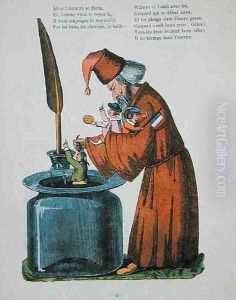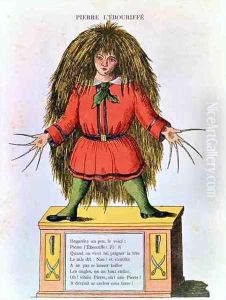Hoffmann, Heinrich Paintings
Heinrich Hoffmann was a German psychiatrist, author, and artist, best known for his work as a writer of children's stories, particularly the Struwwelpeter (Shockheaded Peter) series. Born on June 13, 1824, in Frankfurt am Main, Germany, Hoffmann grew up in a time of significant cultural and political changes in Europe. He pursued medicine at the University of Heidelberg and later specialized in psychiatry, a field that was just beginning to gain recognition.
After completing his studies, Hoffmann returned to Frankfurt, where he worked at the Frankfurt Asylum for the Mentally Ill. His experiences as a psychiatrist influenced much of his writing and artistic work, as he often incorporated themes of mental health and social norms into his stories. Hoffmann's Struwwelpeter, first published in 1845, is a collection of darkly humorous cautionary tales, each featuring children who suffer extreme consequences for their misbehaviors. The book was revolutionary for its time, both for its approach to children's literature and for its illustrations, which Hoffmann himself created.
Throughout his life, Hoffmann continued to work in the field of psychiatry, contributing to the development of practices that emphasized humane treatment and rehabilitation. He also continued writing and illustrating, producing several more books for children and adults. Despite his significant contributions to literature and psychiatry, Hoffmann remained relatively unknown outside of Germany until after his death in Frankfurt on September 20, 1911. Today, Heinrich Hoffmann is remembered not only for his pioneering work in mental health but also as a key figure in the evolution of children's literature.

